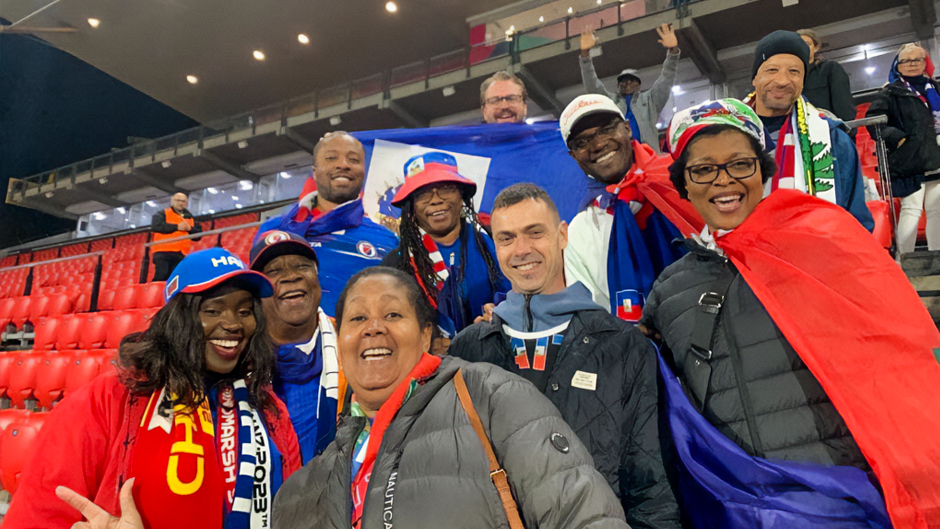With shouts of “Grenadye Alaso” in Creole, or onward warriors, waving their country’s blue and red flag, a group of Haitians from South Florida cheered on the Haitian women’s soccer team during its first participation in the FIFA Women’s World Cup in Australia.
In the group was MarieGuerda Nicolas, a professor at the University of Miami School of Education and Human Development, who had traveled the 9,348 miles with her two daughters, Tatyana and Alexis, just to be present at that special moment.
“It was a historic moment, a moment of joy and hope,” said Haitian-born Nicolas, who, along with eight Haitian Americans from South Florida, supported her country’s team for the two weeks of the tournament. “This was the first time the women’s soccer team had made it there, and to hear the Haitian national anthem sung on an international stage was important.”
Although the team, Les Grenadieres, lost the first game on July 22 with a score of 1-0 to England, its efforts were considerable, said Nicolas. The Haitian goalkeeper made 11 saves during the last game.
“She played so well that every newspaper was talking about her, and it sounded like we won,” said Nicolas.
The team also played against China and lost because of a penalty goal. The last game was against Denmark, and Haiti lost with a score of 2-0.
The 23-member Haitian team had never made it to the World Cup or Olympic Games.
The World Cup was a tremendous moment for the Haitians in the stadium and at home, where Haiti is undergoing a challenging time. Gangs have control of the capital and engage in open warfare. Kidnappings and food and medicine shortages have plagued the country since the July 2021 assassination of President Jovenel Moïse.
The country was deemed so unsafe that officials thought it would be too dangerous to hold a parade or public event when the Women’s World Cup trophy reached Haiti earlier this year (FIFA took it to all 32 nations that participated in the tournament). Instead, it was displayed in a quiet ceremony, according to news reports.
Nicolas pointed out that for the hundreds cheering on the Haitian soccer players—many other fans from other countries joined the Haitians in supporting the team—the World Cup also provided a moment to change the narrative on Haiti. She stated that it was a time to reflect on the athletic excellence that Haiti could produce, even under trying circumstances.
“For me, as a Haitian woman, it was a significant moment, and I brought my girls because this was an important moment for women and women’s history,” Nicolas said. “It was crucial for us to show the team how proud we were of them.”
She also noted that watching such a young team take on much larger and more experienced players was very gratifying. She also was pleasantly surprised to see how many other fans from around the world cheered for Haiti.
“Sports can bring people together,” she said. “We even saw an African drumming team that came to play and support the team.”
Nicolas asked some of the members of the drumming group why they had made the trip.
“They told me: ‘Haiti is a child of Africa, and we are here to support our African brothers and sisters,’” she said.
She also pointed out that there was a great sense of hope in those stadiums.
“Watching the Haitian team play gave us great hope,” Nicolas said. “It made us see that Haiti is possible. Look at what it produced.”

